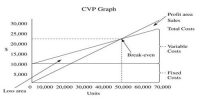Difference between Relevant Cost and Irrelevant Cost
Relevant Cost is a cost that is pertinent to the decision being made. To be relevant, a cost must be a future expected cost that differs between alternatives. Relevant costs are those costs that will make a difference in a decision. Irrelevant Cost is an avoidable cost is a cost that can be eliminated in whole or in part by choosing one alternative over another. These costs are those that will not change in the future when you make one decision versus another.
The difference between relevant cost and irrelevant cost are given below –
Relevant cost
- A cost that is pertinent to the decision being made.
- To be relevant, a cost must be a future expected cost that differs between alternatives.
- Unavoidable costs are irrelevant cost.
- These costs are mainly related to operational or recurring expenditures.
- These costs are incurred mainly by the lower management.
- The types of relevant costs are incremental costs, avoidable costs, opportunity costs, etc.
Irrelevant cost
- A cost that is unrelated to the decision being made.
- Future costs that do not differ between the alternatives.
- Avoidable costs are relevant costs.
- These costs are mainly related to capital or one-off expenditures.
- These costs are mainly incurred by top management.
- The types of irrelevant costs are committed costs, sunk costs, non-cash expenses, overhead costs, etc.















